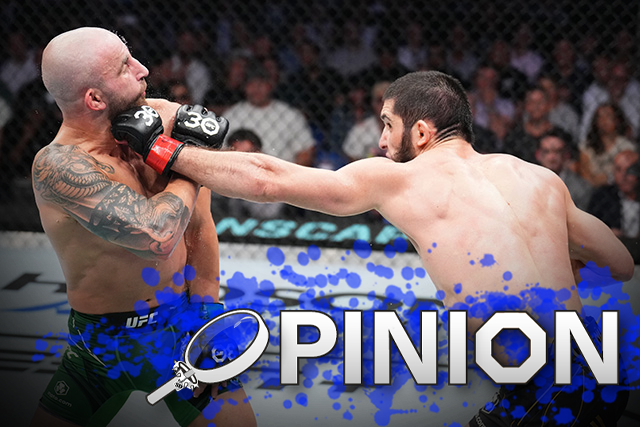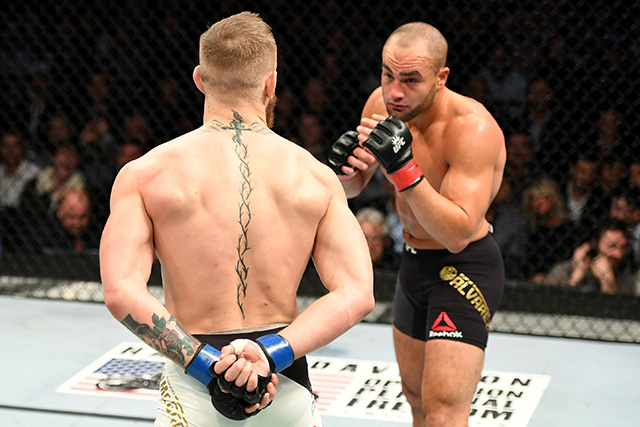
Getty Images/UFC
With this in mind, let's look at every battle between reigning undisputed champions in the UFC, and arrive at a verdict for each, namely: Was it good for the UFC or not?
1. Georges St. Pierre (welterweight) vs. B.J. Penn (lightweight)
UFC 94 | Jan. 31, 2009
As with Makhachev and Volkanovski, Penn and St. Pierre were seen as two of the best champions in the entire sport when they squared off in a rematch, with some believing Penn had won their initial encounter at welterweight, including one cageside judge. The fight turned out be highly anti-climactic, with St. Pierre dominating Penn with repeated takedowns and ground-and-pound, prompting a stoppage at the end of the fourth round. On the one hand, this pushed St. Pierre to a new level of fame and greatness, where he would become one of the UFC's biggest draws. On the other hand, this strongly diminished the aura surrounding “The Prodigy.” Before, many thought he was the best pound-for-pound talent in the sport, good enough to not only beat the welterweight champion, but even challenge for the middleweight crown (yes, seriously). Him being beaten down so thoroughly by St. Pierre through nothing more than wrestling and ground-and-pound shattered all that.
Verdict: Neutral for the UFC

Getty Images/UFC
2. Eddie Alvarez (lightweight) vs. Conor McGregor (featherweight)
UFC 205 | Nov. 12, 2016
The second such fight in UFC history went better than it could have in Dana White's wildest dreams. McGregor looked absolutely sensational, the best he ever has in his career, and became the first man to hold two crowns simultaneously. Not only was it a supremely impressive performance ending in an iconic knockout, but it put McGregor, already one of the biggest draws in MMA history, into a new stratosphere of superstardom. This in turn set up several other massive fights, including McGregor's two encounters with Nate Diaz and his mega-fight against Khabib Nurmagomedov, by far the biggest event in the sport's history, with an obscene 2.4 million buys reported. It's easy to see why this tremendous coup led to more champion-versus-champion matches in the future.
Verdict: Extremely positive for the UFC
Getty Images/UFC
3. Stipe Miocic (heavyweight) vs. Daniel Cormier (light heavyweight)
UFC 226 | July 7, 2018
Cormier and Miocic were actually comparable in terms of drawing power when they met for the first time. Miocic was, with the UFC's support, proclaiming himself the greatest heavyweight ever, and did good pay-per-view numbers for his previous title defense against Francis Ngannou. Cormier's rivalry with Jon Jones was huge, but he wasn't a big draw himself. Cormier was seen as a significant underdog on account of being 39 and seemingly very undersized as a 5-foot-11 heavyweight. After his upset knockout in Round 1, Cormier's profile might have risen a little bit, but as the numbers for his first title defense against Derrick Lewis showed, he still wasn't a massive draw. On the flipside, most no longer viewed Miocic as the greatest heavyweight ever after the loss, not even when he defeated Cormier in the trilogy. The fight itself was fairly entertaining, but nothing spectacular.
Verdict: Neutral for the UFC
Getty Images/UFC
4. Cristiane Justino (featherweight) vs. Amanda Nunes (bantamweight)
UFC 232 | Dec. 29, 2018
Initially, this would appear to be a huge coup for the UFC. They were pushing Nunes heavily and she delivered a devastating, memorable 51-second knockout of seemingly unbeatable “Cris Cyborg,” whom they were having trouble with and likely wanted to jettison. Trouble is, the win did absolutely nothing for Nunes in terms of star power. Her last title defense before the champ-champ fight, against Raquel Pennington in the headliner of UFC 224, had sold a reported 85,000 pay-per-views. Her next one, at UFC 250 against Felicia Spencer, did under 90,000. “Cyborg,” meanwhile, was a bigger draw than Nunes before the fight and likely remained so. Perhaps, despite the UFC's rocky relationship with her, they would have made more money without Justino losing the match and leaving the UFC soon after.
Verdict: Likely neutral for the UFC
Getty Images/UFC
5. Henry Cejudo (flyweight) vs. T.J. Dillashaw (bantamweight)
UFC Fight Night 143 | Jan. 19, 2019
Here we get to the true disasters. Dillashaw's mission in dropping down to challenge Cejudo was clear. His victory would allow the UFC to shutter the men's flyweight division, which it dearly wanted to do. Instead, Dillashaw, widely considered one of the best strikers in the sport, was knocked out on his feet in 32 seconds by Cejudo, a grappler who had never recorded a single standing KO in his UFC career to that point. The loss damaged the reputation of a popular champion in Dillashaw, which was then destroyed he tested positive for performance enhancing drugs a short while later. Would he have tested positive if he didn't have to make the insane cut to 125 pounds while still retaining his power? It's a possibility. Furthermore, any shine that Cejudo got from the victory was limited, since after two more wins, he retired—though there are now rumors of current bantamweight champ Aljamain Sterling facing a returning Cejudo. Of course, the flyweight division was not eliminated, and the fight at least was fun for the 32 seconds it lasted.
Verdict: Extremely negative for the UFC
Getty Images/UFC
6. Jan Blachowicz (light heavyweight) vs. Israel Adesanya (middleweight)
UFC 259 | March 6, 2021
The UFC was pushing Adesanya very hard as its next big superstar. However, he had never remotely attained the popularity of McGregor, Jones or even Anderson Silva. Suddenly, it had a surefire way to turn the corner. Adesanya would challenge Blachowicz to become the light heavyweight champion as well. The Pole was seen as a weaker title holder and Adesanya was undefeated in MMA, which accounts for him being a roughly -250 favorite. What happened was a worst-case scenario. In a highly tactical affair, Blachowicz fought brilliantly to win an unquestionable verdict. Adesanya suffered his first defeat and his aura of perfection was ruined. The fight may have been interesting for die-hards but was seen as dull by most. As a cherry on top, Blachowicz's popularity didn't grow at all, and he lost his very next title defense later that year against Glover Teixeira as a similarly big favorite.
Verdict: Extremely negative for the UFC
Getty Images/UFC
7. Islam Makhachev (lightweight) vs. Alexander Volkanovski (featherweight)
UFC 284 | Feb. 11, 2023
That brings us to our most recent champ-against-champ contest. The fight itself featured superlative skill, but wasn't to every fan's liking. That's inevitable with a style like Makhachev's; either his grappling dominates the opponent and he looks phenomenal, or else the fight features a lot of stalemates and stalls in the grappling as great offense meets great defense. However, the result here actually hurt both men. Volkanovski's amazing 22-fight winning streak and perfect 12-0 record in the UFC are over, even if the loss came from challenging a larger champion. Meanwhile, the seemingly unbeatable goliath Makhachev, who was a -350 favorite, suddenly looked mortal in barely defeating a much smaller foe. Both fantastic champions are tarnished, and it's not clear where to go from here, especially since Volkanovski is clamoring for a rematch, which puts the featherweight division in limbo.
Verdict: Negative for the UFC
Thus, we see that champ-champ fights aren't clear-cut successes for the UFC. In only one case was it massively beneficial. Two other times it was likely neutral and in three it was downright negative, often significantly so. Intuitively, we can understand why. The UFC's popularity comes in large part from the drawing power of its champions, who are often considered the very best in the world, regardless of whether it's warranted or not. When a champion fights a champion, at least one of them is likely to lose that perception, often without the victor gaining anything for it.

